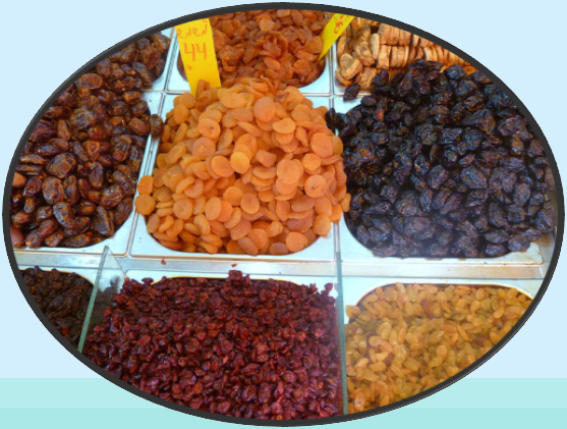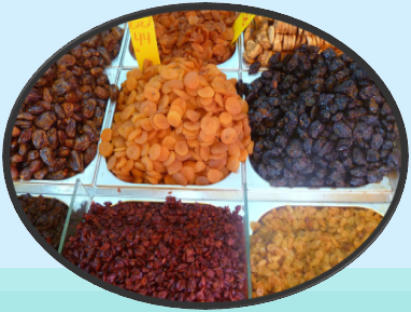

Laliv Pikiwiki Israel, CC BY 2.5 <https://creativecommons.org/licenses/by/2.5>, via Wikimedia Commons
Copyright © 2017 - current year, Gary P. and Leslie G. Eubanks. All Rights Reserved.
Bible Quiz
Fruits
The
Bible
mentions
various
fruits,
and
not
for
the
purpose
of
informing
its
readers
about
the
diet
of
Bible
people.
Fruits
figure
prominently
in
many
stories and have important roles to play in them.
There
are
people
and
places
mentioned
in
the
Bible
whose
names
have
a
fruit
meaning,
such
as
Anab
(“grape”
–
Josh.
11:21,
Tamar
(“date”
–
Gen.
38:6),
Rimmon (“pomegranate – II Sam. 4:2), and Tappuah (“apple” – I Chron. 2:43).
Some
stories
revolve
around
the
fruits
themselves.
The
first
sin,
fruit-eating,
was
committed
by
Adam
and
Eve
(Gen
3:1-19),
the
twelve
spies
judged
the
abundance
of
the
land
of
Canaan
by
the
fruit
they
found
therein
(Num.
13:17-
27),
Abigail
appeased
the
wrath
of
the
soon-to-be
King
David
with
fruit
cakes
(I
Sam.
25:1-35),
Jesus
taught
His
disciples
a
lesson
on
faith
by
cursing
a
fig
tree
(Matt.
21:18-22),
and
sour
grapes
were
used
to
convey
the
principle
that
a
righteous
person
will
not
be
condemned
for
the
sins
of
others
(Ezek.
18:1-
24).
In
the
following
questions,
try
to
identify
the
biblical
fruits
as
well
as
some
of
the people or events involved.
Scripture
References
(NASB,
unless
otherwise
indicated)
(in
random
order):
Eccl.
12:1-8;
J
er.
24:1-10;
cf.
29:1-14
;
Lk.
17:5,6;
Psa.
17:8,9
;
Mic.
6:9-16;
Isa.
1:2-8; cf. 2:6-8
; Ex. 28:31-35;
Ex. 15:22-27
; Gen. 40:1-23;
Num. 11:4-6
1.
God’s
command
to
Moses
for
the
robe
worn
by
the
_____
______
was
that
it
be
made
all
of
blue,
woven
in
one
piece
with
its
hem
ornamented
with
a
depiction
of
a
_________,
woven
with
a
twisted
linen
cord
of
blue,
scarlet,
and purple, alternating with golden bells which tinkled when the priest walked.
2.
After
crossing
the
____
____,
Moses
led
the
people
into
the
wilderness
of
Shur
where
they
initially
found
no
good
water
to
drink,
but
they
eventually
arrived
and
camped
at
Elim
where
there
were
twelve
springs
of
water
and
seventy palm trees, more than likely bearing the sweet fruit, _______.
3.
After
leaving
Mt.
Sinai,
the
people
of
Israel
complained
about
the
lack
of
flesh
to
eat,
remembering
the
fish,
cucumbers,
______,
leeks,
onions,
and
garlic
they
used
to
eat
in
Egypt
and
decrying
the
________they
were
having
to eat daily.
4.
_________’s
metaphor
describing
a
person
in
his
elder
years,
includes
a
reference
to
the
waning
appetite
for
food
or
other
things,
which
was
often
stimulated by eating the ___________.
5.
The
psalmist,
_______,
pleads
with
the
Lord
to
keep
him
as
the
_______
of
His
eye
and
to
hide
him
under
the
shadow
of
His
wings,
safe
from
his enemies.
6.
One
of
Pharaoh’s
officers
was
reinstated
to
his
position
as
___________
three
days
after
Joseph
interpreted
his
dream
as
meaning
that
he
would
again
squeeze the _______ into the king’s cup and give the cup to Pharaoh to drink.
7.
In
his
indictment
against
Jerusalem,
_________
spoke
of
God’s
impending
judgment
in
which
the
wicked
would
sow
seed
and
not
reap,
press
the
_______
but
not
have
any
oil
with
which
to
anoint
themselves,
and
tread
the grapes yet not have any wine to drink.
8.
Upon
being
asked
by
His
disciples
to
increase
their
_______,
Jesus
responded
by
telling
them
that
if
they
had
faith
as
a
grain
of
mustard
seed,
a
very
slight
but
real
faith,
they
would
have
power
sufficient
enough
to
uproot
and plant in the sea the tree that bore the delicious ___________ fruit.
9.
In
the
vision
of
two
baskets,
one
containing
good
_______
and
one
containing
bad,
the
Lord
was
showing
the
prophet
__________
that
He
was
going
not
only
to
bless
the
people
who
had
gone
to
Chaldea
after
the
fall
of
Jerusalem,
but
He
would
also
give
them
a
heart
to
know
Him
so
they
could
be
His people by returning to Him with their whole heart.
10.
Because
of
Judah’s
rebelliousness,
greed,
and
idolatry,
God
warned
_______that
He
would
allow
the
land
to
be
devastated
and
the
city
of
Jerusalem,
though
once
magnificent,
would
be
isolated
like
a
small
farmer’s
hut
in the midst of a __________ field.








Bible Quiz
Fruits
The
Bible
mentions
various
fruits,
and
not
for
the
purpose
of
informing
its
readers
about
the
diet
of
Bible
people.
Fruits
figure
prominently
in
many
stories
and
have
important
roles
to
play
in
them.
There
are
people
and
places
mentioned
in
the
Bible
whose
names
have
a
fruit
meaning,
such
as
Anab
(“grape”
–
Josh.
11:21,
Tamar
(“date”
–
Gen.
38:6),
Rimmon
(“pomegranate
–
II
Sam.
4:2),
and
Tappuah (“apple” – I Chron. 2:43).
Some
stories
revolve
around
the
fruits
themselves.
The
first
sin,
fruit-eating,
was
committed
by
Adam
and
Eve
(Gen
3:1-19),
the
twelve
spies
judged
the
abundance
of
the
land
of
Canaan
by
the
fruit
they
found
therein
(Num.
13:17-27),
Abigail
appeased
the
wrath
of
the
soon-to-be
King
David
with
fruit
cakes
(I
Sam.
25:1-
35),
Jesus
taught
His
disciples
a
lesson
on
faith
by
cursing
a
fig
tree
(Matt.
21:18-22),
and
sour
grapes
were
used
to
convey
the
principle
that
a
righteous
person
will
not
be
condemned
for
the
sins of others (Ezek. 18:1-24).
In
the
following
questions,
try
to
identify
the
biblical
fruits
as
well
as some of the people or events involved.
Scripture
References
(NASB
unless
otherwise
indicated)
(in
random
order):
Eccl.
12:1-8;
Jer.
24:1-10;
cf.
29:1-14
;
Lk.
17:5,6;
Psa.
17:8,9
;
Mic.
6:9-16;
Isa.
1:2-8;
cf.
2:6-8
;
Ex.
28:31-35;
Ex.
15:22-27
; Gen. 40:1-23;
Num. 11:4-6
1.
God’s
command
to
Moses
for
the
robe
worn
by
the
_____
______
was
that
it
be
made
all
of
blue,
woven
in
one
piece
with
its
hem
ornamented
with
a
depiction
of
a
_________,
woven
with
a
twisted
linen
cord
of
blue,
scarlet,
and
purple,
alternating
with
golden bells which tinkled when the priest walked.
2.
After
crossing
the
____
____,
Moses
led
the
people
into
the
wilderness
of
Shur
where
they
initially
found
no
good
water
to
drink,
but
they
eventually
arrived
and
camped
at
Elim
where
there
were
twelve
springs
of
water
and
seventy
palm
trees,
more
than
likely bearing the sweet fruit, _______.
3.
After
leaving
Mt.
Sinai,
the
people
of
Israel
complained
about
the
lack
of
flesh
to
eat,
remembering
the
fish,
cucumbers,
______,
leeks,
onions,
and
garlic
they
used
to
eat
in
Egypt
and
decrying the ________they were having to eat daily.
4.
_________’s
metaphor
describing
a
person
in
his
elder
years,
includes
a
reference
to
the
waning
appetite
for
food
or
other
things,
which
was
often
stimulated
by
eating
the
___________.
5.
The
psalmist,
_______,
pleads
with
the
Lord
to
keep
him
as
the
_______
of
His
eye
and
to
hide
him
under
the
shadow
of
His wings, safe from his enemies.
6.
One
of
Pharaoh’s
officers
was
reinstated
to
his
position
as
___________
three
days
after
Joseph
interpreted
his
dream
as
meaning
that
he
would
again
squeeze
the
_______
into
the
king’s
cup and give the cup to Pharaoh to drink.
7.
In
his
indictment
against
Jerusalem,
_________
spoke
of
God’s
impending
judgment
in
which
the
wicked
would
sow
seed
and
not
reap,
press
the
_______
but
not
have
any
oil
with
which
to
anoint
themselves,
and
tread
the
grapes
yet
not
have
any
wine
to
drink.
8.
Upon
being
asked
by
His
disciples
to
increase
their
_______,
Jesus
responded
by
telling
them
that
if
they
had
faith
as
a
grain
of
mustard
seed,
a
very
slight
but
real
faith,
they
would
have
power
sufficient
enough
to
uproot
and
plant
in
the
sea
the
tree that bore the delicious ___________ fruit.
9.
In
the
vision
of
two
baskets,
one
containing
good
_______
and
one
containing
bad,
the
Lord
was
showing
the
prophet
__________
that
He
was
going
not
only
to
bless
the
people
who
had
gone
to
Chaldea
after
the
fall
of
Jerusalem,
but
He
would
also
give
them
a
heart
to
know
Him
so
they
could
be
His
people
by
returning to Him with their whole heart.
10.
Because
of
Judah’s
rebelliousness,
greed,
and
idolatry,
God
warned
_______that
He
would
allow
the
land
to
be
devastated
and
the
city
of
Jerusalem,
though
once
magnificent,
would
be
isolated
like a small farmer’s hut in the midst of a __________ field.
Laliv Pikiwiki Israel, CC BY 2.5 <https://creativecommons.org/licenses/by/2.5>, via Wikimedia Commons
Copyright © 2017 - current year, Gary P. and Leslie G. Eubanks. All Rights Reserved.





